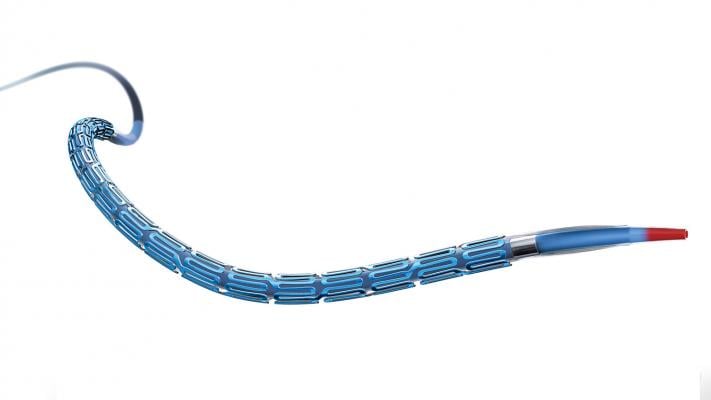
November 6, 2017 — Elderly patients undergoing percutaneous coronary intervention (PCI) often receive bare-metal stents (BMS) instead of drug-eluting stents (DES) to shorten the duration of dual antiplatelet therapy (DAPT) and reduce bleeding risk. However, results from the SENIOR trial found that compared with BMS, shorter DAPT combined with the Synergy bioabsorbable polymer DES leads to less adverse events without increasing bleeding risk.
Findings were reported at the 29th annual Transcatheter Cardiovascular Therapeutics (TCT) scientific symposium sponsored by the Cardiovascular Research Foundation (CRF), Oct. 29-Nov. 2 in Denver. The study was also published simultaneously in The Lancet.
Prior to randomization, 1,200 patients aged 75 and older underwent pre-specification of a tailored DAPT strategy: one month for patients with stable angina or silent ischemia, and six months for patients with acute coronary syndrome (including myocardial infarction). Approximately half of patients were in each category based upon clinical presentation. After the intended duration of DAPT was recorded, 596 were assigned to DES and 604 were assigned to BMS. The stent procedure was successful in 98.1 percent and 97.6 percent (P=0.561), leading to a complete revascularization at baseline in 85.7 percent and 86.1 percent (P=0.860) of DES and BMS-treated patients, respectively. DAPT utilization was similar in both study arms, with approximately half of patients continuing DAPT beyond one month, and only 20 percent of patients (in both groups) continuing DAPT beyond six months.
The primary endpoint of all-cause mortality, myocardial infarction, stroke or ischemia-driven target lesion revascularization occurred in 68 patients (11.6 percent) in the DES group (N=584) and in 98 patients (16.4 percent) in the BMS group (N=592) (RR 0.71; 95% CI, 0.52-0.94; P=0.0160). This was mainly driven by ischemia driven target-lesion revascularization which was reported in 10 patients (1.7 percent) in the DES group and in 35 patients (5.9 percent) in the BMS group (RR 0.29, 95% CI, 0.09-0.49; P=0.0002). Bleeding complications BARC 2-5 (4.5 percent vs. 5 percent; RR 0.90; 95% CI, 0.51-1.54; P=0.68) and stent thrombosis (0.5 percent vs. 1.4 percent, RR 0.38, 95% CI, 0.00-1.48; P=0.1315) rates were low in both groups.
“The elderly represents a fast-growing segment of the population undergoing PCI. They have been poorly represented in prior studies on DES and DAPT duration, so there is no clear recommended PCI strategy for this group,” said principal investigator Olivier Varenne, M.D., Ph.D., with the Cardiology Department at Cochin Hospital in Paris, France. “The SENIOR trial shows that among elderly patients who undergo PCI, a DES and a short duration of DAPT is superior to BMS with respect to the occurrence of all-cause mortality, myocardial infarction, stroke and ischemia-driven target lesion revascularization. Therefore, BMS should no longer be used as a strategy to reduce DAPT duration in these patients.”
The SENIOR trial was funded by an unrestricted grant from Boston Scientific. Varenne reported lecture fees from Boston Scientific, Abbott Vascular, AstraZeneca and Servier.
For more information: www.tctconference.com
Related Content
TCT 2017 Late-breaking Clinical Trial Presentations
Reference:


 August 28, 2023
August 28, 2023 









